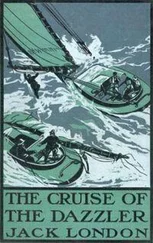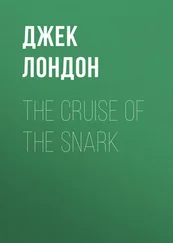Jack London - The Cruise of the Snark
Здесь есть возможность читать онлайн «Jack London - The Cruise of the Snark» весь текст электронной книги совершенно бесплатно (целиком полную версию без сокращений). В некоторых случаях можно слушать аудио, скачать через торрент в формате fb2 и присутствует краткое содержание. Жанр: Классическая проза, Морские приключения, на английском языке. Описание произведения, (предисловие) а так же отзывы посетителей доступны на портале библиотеки ЛибКат.
- Название:The Cruise of the Snark
- Автор:
- Жанр:
- Год:неизвестен
- ISBN:нет данных
- Рейтинг книги:3 / 5. Голосов: 1
-
Избранное:Добавить в избранное
- Отзывы:
-
Ваша оценка:
- 60
- 1
- 2
- 3
- 4
- 5
The Cruise of the Snark: краткое содержание, описание и аннотация
Предлагаем к чтению аннотацию, описание, краткое содержание или предисловие (зависит от того, что написал сам автор книги «The Cruise of the Snark»). Если вы не нашли необходимую информацию о книге — напишите в комментариях, мы постараемся отыскать её.
The Cruise of the Snark — читать онлайн бесплатно полную книгу (весь текст) целиком
Ниже представлен текст книги, разбитый по страницам. Система сохранения места последней прочитанной страницы, позволяет с удобством читать онлайн бесплатно книгу «The Cruise of the Snark», без необходимости каждый раз заново искать на чём Вы остановились. Поставьте закладку, и сможете в любой момент перейти на страницу, на которой закончили чтение.
Интервал:
Закладка:
"Get out of the way! I'm coming!" I shout, frantically dashing my cap at the winged vipers around me.
On one side of the trail the landscape rises straight up. On the other side it sinks straight down. The only way to get out of my way is to keep on going. How that string of horses kept their feet is a miracle; but they dashed ahead, over-running one another, galloping, trotting, stumbling, jumping, scrambling, and kicking methodically skyward every time a wasp landed on them. After a while we drew breath and counted our injuries. And this happened not once, nor twice, but time after time. Strange to say, it never grew monotonous. I know that I, for one, came through each brush with the undiminished zest of a man flying from sudden death. No; the pilgrim from Taiohae to Typee will never suffer from ennui on the way.
At last we arose above the vexation of wasps. It was a matter of altitude, however, rather than of fortitude. All about us lay the jagged back-bones of ranges, as far as the eye could see, thrusting their pinnacles into the trade-wind clouds. Under us, from the way we had come, the Snark lay like a tiny toy on the calm water of Taiohae Bay. Ahead we could see the inshore indentation of Comptroller Bay. We dropped down a thousand feet, and Typee lay beneath us. "Had a glimpse of the gardens of paradise been revealed to me I could scarcely have been more ravished with the sight"—so said Melville on the moment of his first view of the valley. He saw a garden. We saw a wilderness. Where were the hundred groves of the breadfruit tree he saw? We saw jungle, nothing but jungle, with the exception of two grass huts and several clumps of cocoanuts breaking the primordial green mantle. Where was the Ti of Mehevi, the bachelors' hall, the palace where women were taboo, and where he ruled with his lesser chieftains, keeping the half-dozen dusty and torpid ancients to remind them of the valorous past? From the swift stream no sounds arose of maids and matrons pounding tapa. And where was the hut that old Narheyo eternally builded? In vain I looked for him perched ninety feet from the ground in some tall cocoanut, taking his morning smoke.
We went down a zigzag trail under overarching, matted jungle, where great butterflies drifted by in the silence. No tattooed savage with club and javelin guarded the path; and when we forded the stream, we were free to roam where we pleased. No longer did the taboo, sacred and merciless, reign in that sweet vale. Nay, the taboo still did reign, a new taboo, for when we approached too near the several wretched native women, the taboo was uttered warningly. And it was well. They were lepers. The man who warned us was afflicted horribly with elephantiasis. All were suffering from lung trouble. The valley of Typee was the abode of death, and the dozen survivors of the tribe were gasping feebly the last painful breaths of the race.
Certainly the battle had not been to the strong, for once the Typeans were very strong, stronger than the Happars, stronger than the Taiohaeans, stronger than all the tribes of Nuku-hiva. The word "typee," or, rather, "taipi," originally signified an eater of human flesh. But since all the Marquesans were human-flesh eaters, to be so designated was the token that the Typeans were the human-flesh eaters par excellence. Not alone to Nuku-hiva did the Typean reputation for bravery and ferocity extend. In all the islands of the Marquesas the Typeans were named with dread. Man could not conquer them. Even the French fleet that took possession of the Marquesas left the Typeans alone. Captain Porter, of the frigate Essex, once invaded the valley. His sailors and marines were reinforced by two thousand warriors of Happar and Taiohae. They penetrated quite a distance into the valley, but met with so fierce a resistance that they were glad to retreat and get away in their flotilla of boats and war-canoes.
Of all inhabitants of the South Seas, the Marquesans were adjudged the strongest and the most beautiful. Melville said of them: "I was especially struck by the physical strength and beauty they displayed . . . In beauty of form they surpassed anything I had ever seen. Not a single instance of natural deformity was observable in all the throng attending the revels. Every individual appeared free from those blemishes which sometimes mar the effect of an otherwise perfect form. But their physical excellence did not merely consist in an exemption from these evils; nearly every individual of the number might have been taken for a sculptor's model." Mendana, the discoverer of the Marquesas, described the natives as wondrously beautiful to behold. Figueroa, the chronicler of his voyage, said of them: "In complexion they were nearly white; of good stature and finely formed." Captain Cook called the Marquesans the most splendid islanders in the South Seas. The men were described, as "in almost every instance of lofty stature, scarcely ever less than six feet in height."
And now all this strength and beauty has departed, and the valley of Typee is the abode of some dozen wretched creatures, afflicted by leprosy, elephantiasis, and tuberculosis. Melville estimated the population at two thousand, not taking into consideration the small adjoining valley of Ho-o-u-mi. Life has rotted away in this wonderful garden spot, where the climate is as delightful and healthful as any to be found in the world. Not alone were the Typeans physically magnificent; they were pure. Their air did not contain the bacilli and germs and microbes of disease that fill our own air. And when the white men imported in their ships these various micro-organisms or disease, the Typeans crumpled up and went down before them.
When one considers the situation, one is almost driven to the conclusion that the white race flourishes on impurity and corruption. Natural selection, however, gives the explanation. We of the white race are the survivors and the descendants of the thousands of generations of survivors in the war with the micro- organisms. Whenever one of us was born with a constitution peculiarly receptive to these minute enemies, such a one promptly died. Only those of us survived who could withstand them. We who are alive are the immune, the fit—the ones best constituted to live in a world of hostile micro-organisms. The poor Marquesans had undergone no such selection. They were not immune. And they, who had made a custom of eating their enemies, were now eaten by enemies so microscopic as to be invisible, and against whom no war of dart and javelin was possible. On the other hand, had there been a few hundred thousand Marquesans to begin with, there might have been sufficient survivors to lay the foundation for a new race—a regenerated race, if a plunge into a festering bath of organic poison can be called regeneration.
We unsaddled our horses for lunch, and after we had fought the stallions apart—mine with several fresh chunks bitten out of his back—and after we had vainly fought the sand-flies, we ate bananas and tinned meats, washed down by generous draughts of cocoanut milk. There was little to be seen. The jungle had rushed back and engulfed the puny works of man. Here and there pai-pais were to be stumbled upon, but there were no inscriptions, no hieroglyphics, no clues to the past they attested—only dumb stones, builded and carved by hands that were forgotten dust. Out of the pai-pais grew great trees, jealous of the wrought work of man, splitting and scattering the stones back into the primeval chaos.
We gave up the jungle and sought the stream with the idea of evading the sand-flies. Vain hope! To go in swimming one must take off his clothes. The sand-flies are aware of the fact, and they lurk by the river bank in countless myriads. In the native they are called the nau-nau, which is pronounced "now-now." They are certainly well named, for they are the insistent present. There is no past nor future when they fasten upon one's epidermis, and I am willing to wager that Omer Khayyam could never have written the Rubaiyat in the valley of Typee—it would have been psychologically impossible. I made the strategic mistake of undressing on the edge of a steep bank where I could dive in but could not climb out. When I was ready to dress, I had a hundred yards' walk on the bank before I could reach my clothes. At the first step, fully ten thousand nau-naus landed upon me. At the second step I was walking in a cloud. By the third step the sun was dimmed in the sky. After that I don't know what happened. When I arrived at my clothes, I was a maniac. And here enters my grand tactical error. There is only one rule of conduct in dealing with nau-naus. Never swat them. Whatever you do, don't swat them. They are so vicious that in the instant of annihilation they eject their last atom of poison into your carcass. You must pluck them delicately, between thumb and forefinger, and persuade them gently to remove their proboscides from your quivering flesh. It is like pulling teeth. But the difficulty was that the teeth sprouted faster than I could pull them, so I swatted, and, so doing, filled myself full with their poison. This was a week ago. At the present moment I resemble a sadly neglected smallpox convalescent.
Читать дальшеИнтервал:
Закладка:
Похожие книги на «The Cruise of the Snark»
Представляем Вашему вниманию похожие книги на «The Cruise of the Snark» списком для выбора. Мы отобрали схожую по названию и смыслу литературу в надежде предоставить читателям больше вариантов отыскать новые, интересные, ещё непрочитанные произведения.
Обсуждение, отзывы о книге «The Cruise of the Snark» и просто собственные мнения читателей. Оставьте ваши комментарии, напишите, что Вы думаете о произведении, его смысле или главных героях. Укажите что конкретно понравилось, а что нет, и почему Вы так считаете.







